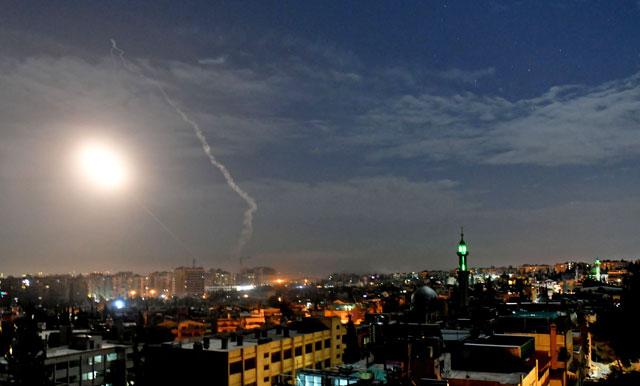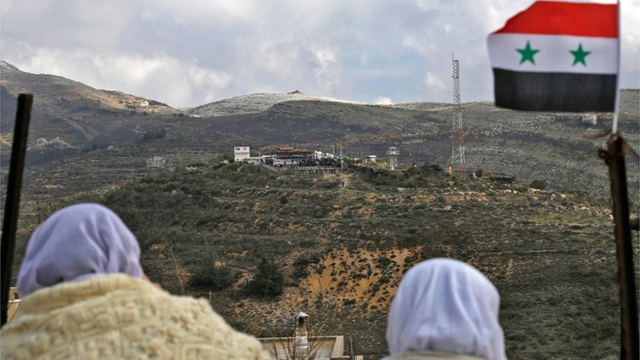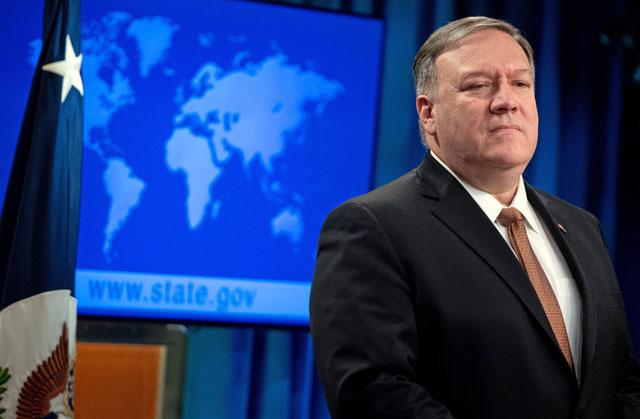You are here
Israeli attacks in Syria: What you need to know
By AFP - Jan 21,2019 - Last updated at Jan 21,2019

Missile fire is seen over Damascus, Syria, on Monday (Reuters photo)
OCCUPIED JERUSALEM — Israel attacked what it said were Iranian targets in Syria early on Monday in response to missile fire it blamed on Iran.
Here are a series of questions and answers on the situation:
What happened?
Israel announced a series of air strikes against facilities it said belonged to the Iranian Revolutionary Guard’ Quds Force in the early hours of Monday.
It said the strikes were in response to a medium-range, surface-to-surface missile the Quds Force fired from Syria at the Israeli-occupied Golan Heights on Sunday, which Israeli air defences intercepted.
Earlier that day, Damascus had accused Israel of carrying out raids in southern Syria.
The Syrian Observatory for Human Rights war monitor said at least 11 pro-regime fighters, including two Syrians, were killed in Monday’s strikes.
Why does Israel attack in Syria?
The Israeli forces have since 2013 claimed hundreds of attacks on what it says are Iranian military targets and advanced arms deliveries to Tehran-backed Hizbollah, with the goal of stopping its main enemy Iran from entrenching itself militarily in neighbouring Syria.
On Monday, Israeli Prime Minister Benjamin Netanyahu said that Iran made “explicit statements” on its intention “to destroy Israel”.
Which Iranian forces are in Syria?
Thousands of Iranian forces have been deployed to Syria over the course of the war, according to observatory.
They include members of the Islamic Revolutionary Guard Corps (IRGC) headed by Qassem Soleimani, the mastermind of Tehran’s military strategy in the region.
Iran also deployed regular army units to Syria and has sway over tens of thousands of militiamen belonging to Shiite groups, including Lebanon’s powerful Hizbollah.
According to the head of the IRGC, Iran has “military and revolutionary advisers” in Syria.
Major General Mohammad Ali Jafari has also said that there is “equipment and weapons necessary for training and empowering the Islamic resistance fighters and for supporting the oppressed people of Syria”.
Jafari made those comments on January 16 when responding to Netanyahu’s demand that Iran remove its forces from Syria, saying that those elements would “be kept there”.
What about the US withdrawal from Syria?
Some observers argue that a US troop pullout will create a vacuum allowing Iran to further expand its influence in Syria, including by consolidating a “land bridge” to the Mediterranean and bringing Tehran’s military capabilities closer to Israel’s northern borders.
Israeli officials and analysts have stressed that the Jewish state has long managed that front alone and would continue to do so.
Russia is the other main backer of the government in Damascus but is sometimes described as Iran’s main rival in Syria and has done little to stop Israeli strikes against Iranian interests there.
Do Israel and Russia coordinate in Syria?
The two countries have long had a hotline to avoid accidental clashes in Syria, but Israel has had to tread more carefully in recent months.
A friendly fire incident in September that led to a Russian plane being downed by Syrian air defences during an Israeli raid angered the Kremlin.
As part of its response, Russia delivered the advanced S-300 air defence system to Syria.
Related Articles
TEHRAN — An improvised bomb has killed an Iranian colonel from the aerospace division of the Islamic Revolutionary Guard Corps near Syria's
WASHINGTON/DUBAI — US President Donald Trump on Monday branded Iran's elite Islamic Revolutionary Guard Corps (IRGC) a terrorist organisatio
Two Iranian Revolutionary Guardsmen were killed by a US drone in the Iraqi city of Tikrit, Iranian state media said Monday, in a report that was denied by the Pentagon.

















